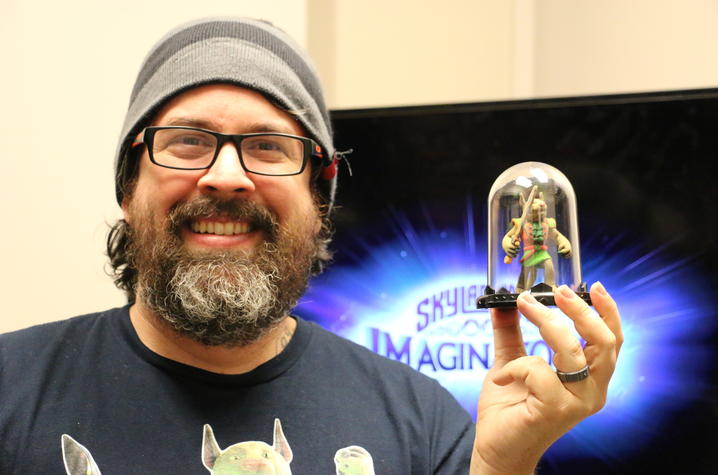Uniting Video Games, Teaching and Research

LEXINGTON, Ky. (Feb. 15, 2017) — Nathan Stevens, media officer in the University of Kentucky College of Communication and Information, is often sought out for his expertise in media and electronics. Not only by the college, but also by companies across the U.S.
Last semester, he was one of the first individuals to try out the new "Skylanders Imaginators" video game, a must-have toy for the holiday season. Stevens runs a video game and movie review website and the company reached out to him before launch. The game allows players to design their own game characters and order a 3D printed version from the company. His creation: Connor Meow. A cat, of course. The game was later named a 2016 Best Family Game in the Game Critics Awards.
In the College of Communication and Information, he produces media and helps direct the CI Collective, a technology usability lab where students and faculty work together to test emerging technologies. The primary purpose of the CI Collective is to support interdisciplinary research on human-computer interaction and related areas in understanding how people use communication technology and learn from information systems.
Technology developers might have one use in mind, but consumers of all ages may find that a technological device may be used to fill a separate and distinct need. Research conducted in the CI Collective will help determine how users interact with technology.
Stevens has made sure to connect his contacts in the video game and electronics industry to the college and UK students. In addition to being college media officer, he teaches MAS 435, "The History of Video Games and The Industry," and gives an overview of the industry and an examination of the technological advances in both software and hardware.
In one lecture, he had a representative from Bethesda Softworks LLC, a large computer entertainment software company, Skype in to the class. Several of Stevens' connections have also reached out to get involved in the usability lab.
Stevens recently attended the Consumer Electronics Show in Las Vegas, where he sought out new technology and contacts for usability testing and research. This year’s show had a lot of focus on virtual reality (VR), augmented reality (AR) and the 360-degree camera.
Stevens said the industry seemed to know that VR and AR are here to stay, not only in an entertainment capacity, but also for storytelling and marketing usage. "The health technology was also intriguing with different ways to maintain your own health at home without really the need for doctor intervention, on a smaller less urgent level of self-checkups," he said. "All in all, it was quite an amazing show with a lot of neat gadgets on display. A geek’s dream."




